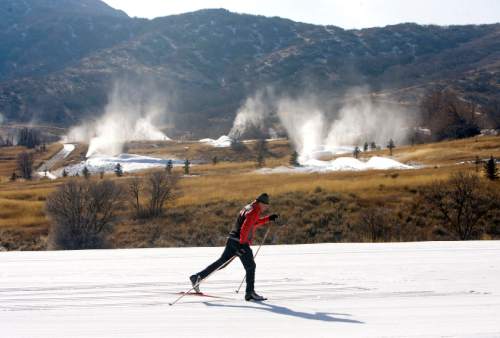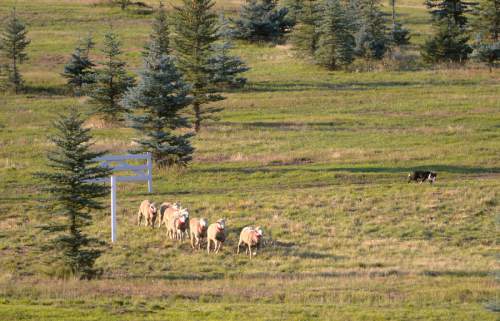This is an archived article that was published on sltrib.com in 2016, and information in the article may be outdated. It is provided only for personal research purposes and may not be reprinted.
All of the venues created specifically for the 2002 Winter Olympics will be reunited in one organization Sunday.
The Utah Olympic Legacy Foundation (UOLF), which has operated the speedskating oval in Kearns and the bobsled/jumping/aerials complex outside of Park City since the Games ended, will take over the Soldier Hollow cross-country skiing facility in Midway.
Terms of the merger were not disclosed.
"With this acquisition," said a joint statement Friday from parties involved in the facility, "UOLF plans to utilize its strengths in venue operations, inclusive programming and fundraising to facilitate continued growth and improvements at Soldier Hollow."
When the Olympics were over, and the focus turned to keeping the venues operating in fulfillment of Salt Lake City's pledge to become the nation's winter-sports capital, the UOLF received a $76 million endowment from the Salt Lake Organizing Committee to run Utah Olympic Park and Utah Olympic Oval.
Both facilities came about through a 1989 referendum in which Utah voters approved a sales-tax diversion to build Olympics-related facilities before Salt Lake was awarded the 2002 Games. But the cross country and biathlon course, which were developed much later in the Olympic preparation process, was on its own.
For more than 14 years, the nonprofit Soldier Hollow Legacy Foundation kept the venue going with youth programs, training opportunities for elite Nordic athletes, a popular tubing hill and unique niche offerings such as the Soldier Hollow Sheepdog Classic event.
But it's been a hard slog.
Last year, the Soldier Hollow board initiated merger talks with the UOLF after deciding "the venue needed a long-term vision, strategic planning and access to new financial resources."
"Our organizations share a passion for continuing the legacy," said Bill Stenquist, Soldier Hollow board chairman. "We serve as steward of not only the venues but also the Olympic spirit which inspired so many of us. Together, we believe that we can do even more for Utah's communities and America's athletes."
Colin Hilton, UOLF president and CEO, said Soldier Hollow will blend well into his organization's broad purpose of "evolving into community recreation centers and visitor destinations."
The group's news release emphasized that point, too.
"Utah represents one of the most successful Olympic legacy models in the world," it said. "UOLF has proven that Olympic venues can evolve, stay relevant and ultimately provide communities with access to sport opportunities for all ages and abilities."
It just makes sense, said Luke Bodensteiner, the U.S. Ski and Snowboard Association executive who is the UOLF board chairman and a Soldier Hollow board member.
"Our venues provide sustained dividends," he said. "The world comes to train in Utah."
The partnership excited Fred Hayes, director of the state division of parks xand recreation, since Soldier Hollow is on lands that are part of Wasatch Mountain State Park.
"In virtually all respects, the goals and mission of the UOLF and those of Utah's state parks are identical," Hayes said. "We share a common vision of increasing the use of the venue by applying proven business principles. The people of Utah are going to be thrilled with what is coming to Soldier Hollow."
Olympic legacy
The Utah Olympic Legacy Foundation's three venues (Utah Olympic Park, Utah Olympic Oval and Soldier Hollow) played host to eight of the 15 winter sports at the 2002 Winter Games, accounting for 44 of its 78 gold-medal events.
The legacy will continue Jan. 30-Feb. 5, 2017 when Soldier Hollow and Utah Olympic Park will stage the 2017 Nordic Junior and Under-23 World Ski Championships featuring 800 athletes from 30 countries.





